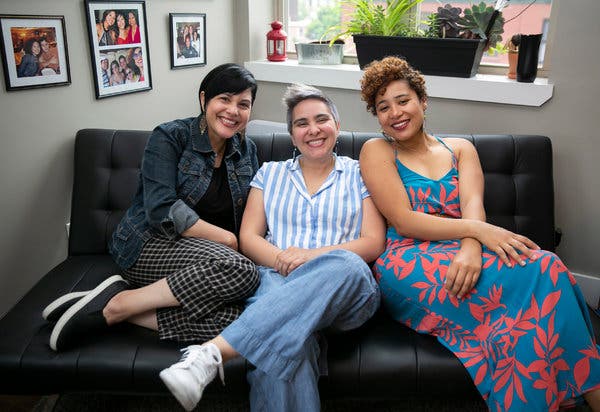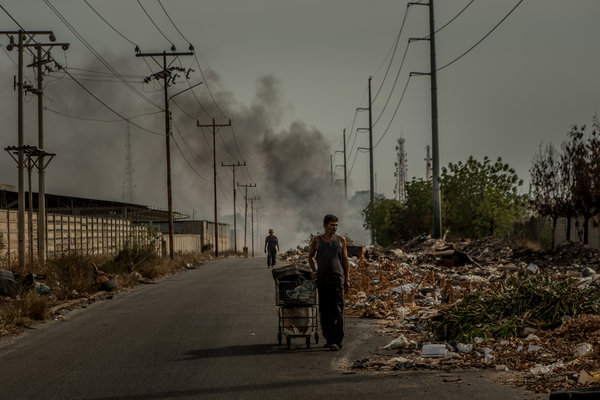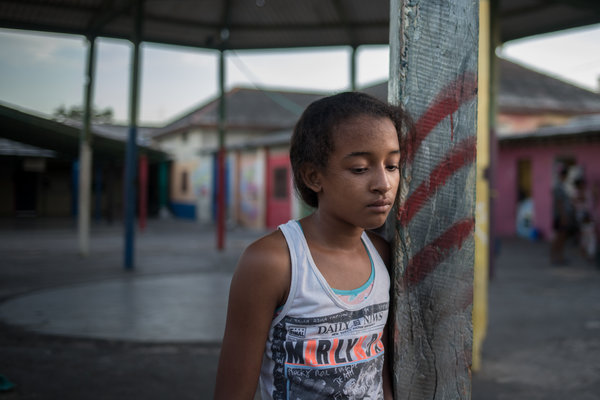By midafternoon on a recent Saturday, Ana Fernández was sore. She rolled her neck from side to side, nursing an old injury she’d suffered after a tear-gas canister hit her at a protest in Caracas, Venezuela.
This is her first season running a food stall, Váyalo Cocina (“Let’s Go Kitchen” in Spanish), at Smorgasburg, the weekly outdoor culinary bazaar in Williamsburg, Brooklyn. She has started to get the hang of it — the days of advance cooking, the insistent heat from the portable grill, the endless press of customers — but the rigors of the routine still catch up with her.
As she took orders, Ms. Fernández, 40, scratched them out in an increasingly illegible scrawl. Her wife, Katherine Rengifo, 27, was red-faced after spending all day flipping arepas, stuffed South American cakes made of cornmeal. Ms. Fernández’s sister, Paola, 48, had long since stopped dancing to the calypso music pulsing from a speaker at the front of the stall.
“Que calor” (this heat), Ana Fernández said, fanning herself with a paper plate. She had already served almost 300 arepas and dozens of hot dogs, each prepared to order. “This is what Venezuela weather is like, except there, we lived on the beach.”

CreditNicole Craine for The New York Times
Váyalo Cocina serves the only Venezuelan food at the current Smorgasburg, where the 100 stalls are as diverse as New York City itself. Since its debut in 2011, the market has been a foundational influence in Brooklyn’s food renaissance. Its success has spawned other locations in New York, Washington and Los Angeles.
More than 1,000 vendors apply each year for fewer than 30 open spots; acceptance at Smorgasburg can lead the way to a brick-and-mortar restaurant and even national attention. But landing a spot is only the first step. Many vendors, like the women behind Váyalo Cocina, work two or three other jobs to support themselves.
Back in Venezuela, Ms. Fernández and Ms. Rengifo were successful entrepreneurs. They ran a bathing-suit design company and store on Margarita Island, a popular beach destination in the Caribbean.
For 14 years, Ms. Fernández toiled with a single-minded focus on her own independence. Her mother had worked for the national electric company, and would come home after long hours of work she found meaningless. She used to tell her daughter: You have to be your own boss. Don’t let anyone tell you what to do.
After the Fernández sisters and Ms. Rengifo came to the United States in 2016, they cooked traditional Venezuelan food as an antidote to their homesickness. If you could make it taste like it did back home, they figured, you could almost convince yourself that you’re there.
In December 2018, almost a year after first hearing about Smorgasburg, they planned a menu, came up with a name and auditioned their food at the organization’s headquarters in Crown Heights, Brooklyn.
“At the tasting, they asked, ‘Do you think you are prepared to take care of hundreds of people in one day?’ I said, ‘No,’” Ana Fernández said, laughing. “Honestly, I didn’t think we were prepared.”
Eric Demby, a founder of Smorgasburg, said he was struck by their personalities. “I go on my gut with all of this stuff,” he said. “They had a really nice spirit to them, and we’re not ignorant to the plight of that country right now. We wanted to give them a shot.”
Street hot dogs, popular in South America, have been a big seller at the market over the years. Váyalo Cocina offers one with bacon, onions, avocado and several sauces. It’s called a Tumba Rancho, which roughly translates as “bring down the house,” because it’s so overloaded that it can fall apart while you eat it.
“With all those toppings?” Mr. Demby said. “Perfect for Smorgasburg.”
On this Saturday morning, the women woke at 6:15 to move 75-quart coolers full of precooked frozen arepas down the stairs of their third-floor walk-up in Bedford-Stuyvesant, Brooklyn. Photographs of friends and family line the walls, taken when the women could put their arms around the people they loved. Most of them have also left Venezuela.
An hour later, the three sat in the back of a van they hired to transport them to and from the market. When the driver, their friend Angel Freire Jr., careened around a turn, Ms. Rengifo reached out to keep a tote bag of avocados from spilling onto the floor. “We’re getting good at this,” she said.
Ms. Rengifo is the cook in their family — she learned everything she knows from her mother-in-law — so she handles the hot food. In the beginning, she kept burning herself on the grill. As spring slipped into summer and she gained practice, the fingernail-length burns on her forearms faded.
Arriving at the concrete flattop that fills with vendors each week, they set up tables and hung their hand-painted signs at the front of the tent. They pulled on the custom aprons, stitched with the stall’s name in needlepoint on the front, that Paola Fernández made them out of old jeans. Before 11 a.m., when the hungry hordes would arrive, grills needed to be heated, tables cleaned, hundreds of forks individually wrapped in napkins: three flicks of a wrist — one, two, three — into the paper cocoons.
Suddenly, Ms. Rengifo cried out. She had forgotten to bring the warming tubs that hold the fillings for the arepas. She ran through the rising tents to stop the van, just in time.
“Every single day, it’s a mess. A good mess, but a mess,” Ana Fernández said, shaking her head. “It all goes bad, and then we fix it. It’s how it is.”
Their first week at the market, in early April, was a disaster. Customers waited half an hour or more as Ms. Rengifo made each arepa from scratch. By the second week, she had learned how to precook the arepas, but things didn’t go much better; a strong wind took all their napkins, and she cried as she held onto the tent to keep it from blowing away. The third week brought a storm so fierce that the rain came in sideways; they barely broke even. And the fourth week, Mr. Freire forgot to pick them up on time.
Still, their arepas were popular. Made from maize and naturally gluten-free, they appeal to the health-conscious Brooklyn crowd. They’re easy to eat by hand, and the colorful hot dogs are as Instagrammable as they are tasty. “There’s a strategy to Smorgasburg,” said Kevin Kriegel, 32, a Brooklynite and a regular. “You want to try to not get too much of one thing, so that you can try everything. Arepas, they’re great for that.”
When Ms. Fernández and Ms. Rengifo arrived in the United States three years ago, they had come for a vacation, hoping to withdraw the money they had saved in American banks. They intended to leave Venezuela soon after their scheduled return, maybe for Uruguay or Argentina, where they could continue operating their business and live closer to friends and family who were also departing.
Venezuela has been unraveling for years; decades of corruption have led to a wide economic collapse that has left water pipes dry, garbage piled in the streets and the sick without medicine. The government has persecuted and even killed political opponents who threaten its power. Almost 3.7 million people have left Venezuela since 2014, according to the International Organization for Migration.
As protests escalated during their vacation, and their family sent frightened messages, the couple decided not to board their return flight. They hadn’t said goodbye to anyone at home. They’d left a house and a business, photo albums and heirlooms.
They waited in the United States, unsure whether to stay or return. Three years later, they have an open asylum claim, citing fears of persecution in Venezuela. They’re uncertain whether they will be allowed to stay, but have decided to build their business nonetheless.
“It’s like purgatory, like limbo,” Ms. Fernández said, her voice breaking. She tries to stay strong for her wife, but sometimes, it’s hard. “I was hoping everything could change, and we could go back. I sometimes feel like I am never going to be able to go back and see my family.”
They’ve done whatever they can to make money: working as nannies and line cooks, cleaning houses and making coffee — juggling multiple jobs, trying to improve their English and scrape together rent.
Smorgasburg has provided a way forward. Just before they opened for the day, Ms. Fernández put $1 in the tip jar. She stepped back, looked, and readjusted the bill so it would be more visible. Everything they make in tips, they send home, either directly to friends and family in need, or anonymously through a GoFundMe page.
Their first customer of the morning ordered an arepa called the Reina Pepiada, a creamy mix of shredded chicken, mayonnaise, avocado and parsley. As Ms. Fernández handed it over, she asked, “Do you want to know why the Reina Pepiada is called the Reina Pepiada?”
The name, which means curvy queen, pays homage to Susana Duijm, who was Miss Venezuela in the 1955 Miss Universe pageant. She loved this combination of flavors, or so the story goes. The Reina Pepiada has become a national favorite, often eaten at breakfast. On their handmade sign, Ms. Rengifo drew a little crown over the R.
One of the stand’s two vegan offerings — the Mama Gladis, which comes with a whole avocado, olive oil and tomato — is named in honor of the Fernándezes’ mother, who still lives in Venezuela.
“You feel like your mom or your grandma are making these arepas,” said Adrian Muñoz, a customer who moved to New York from Venezuela more than two years ago. “Because of the smell. It smells just like how it’s supposed to smell.”
For the first few hours, Váyalo Cocina crackled with fun. The women danced, plastic gloves on. Ms. Rengifo snapped her shoulders back and forth, and kicked her heels out, toe-tapping to the calypso beat. “We dance when our feet start to hurt,” she said. “And our feet start to hurt as soon as we start to dance.”
Even Ana Fernández danced, and she said she never dances. “You have to laugh, or you cry,” she said.
By 3 p.m., time had become molten. Ms. Fernández took an order and smiled. Credit card? You’re paying cash? Would you like the vegan option? A long line formed, and customers blurred together. Thank you, enjoy your day, enjoy your meal.
They prepare throughout the week for their Saturday grind. After working all day in coffee shops and kitchens, they cook all night in a friend’s commercial kitchen in Carroll Gardens, Brooklyn. Including the 16 or so hours each Saturday at Smorgasburg, they each work well over 40 hours a week.
During a lull, Ms. Rengifo took a moment to sit. Above her on the back wall hung two flags: Venezuela’s, and the rainbow Pride flag. In the United States, she said, she can say, “This is my wife.” Not only will no one will tell them they are sinning, but people are supportive — even excited.
“In Venezuela, we were, like, friends,” Ms. Fernández said. “Here we are more open. The difference is huge.”
Back home, they couldn’t be affectionate in public. In New York, sometimes, they are. Once, as Ms. Fernández turned to pass Ms. Rengifo an order, she touched her lightly on the small of her back. Once, as Ms. Rengifo stretched, Ms. Fernández hugged her briefly, their cheeks touching.
At 4:30 p.m., just as they started running out of plantains, Claritza R. Welman de Pinto, 61, who is also Venezuelan, stepped forward from the line. Smorgasburg was a stop during a visit to her daughter, who lives in New York. Ms. Welman de Pinto said she was moved to see her country’s cuisine represented so far from home.
As she ordered, she started to cry. Ms. Rengifo began crying, too, a half-made arepa in her hand.
“We’re crying because of empathy,” said Clairet Pinto Welman, 39, Ms. Welman de Pinto’s daughter. “When we see people like them, who left Venezuela and have come to another country trying to start from zero, we cry. We cry and we hug.”
They showed one another photos of Venezuela on their phones, talking rapidly about the way the country had changed in the last few years.
“I am traumatized, honestly,” Ms. Fernández said. “When Venezuela was fine, it was like here. Having a regular country, having regular things. Now, we don’t even have electricity. There’s nothing, absolutely nothing there.”
She took a breath before turning to clean the grill and throw away the trash.
After the market closed at 6, the women swiftly broke down the stall. They learned to move quickly in Venezuela, where they had only half an hour of running water each day to wash dishes, take showers, do laundry and stockpile enough to drink and cook with.
Their work done, they packed into Mr. Freire’s truck and handed him a few unsold arepas.
Back at the apartment, once they had carried everything upstairs, Ms. Fernández counted the money. They had made almost $2,800, a net profit of about $1,400 after paying for ingredients, Smorgasburg rent and the van. The tip jar yielded $63 — not a lot, she said, but in Venezuela, it could help. The minimum wage, newly adjusted for rampant inflation, is less than $7 a month.
Most of their profit goes toward expanding Váyalo Cocina. They’ll open a stand at other outdoor settings soon. They’re thinking of starting a delivery-only business.
But that’s far down the line. By 9 p.m., they were beat. They showered and relaxed.
Maybe this Saturday night, they joked, as on so many Saturday nights, Ms. Rengifo would talk in her sleep. In Venezuela, she used to have nightmares about the military and the protests. Here, after a day over the grill, she sometimes sells arepas in her dreams.







